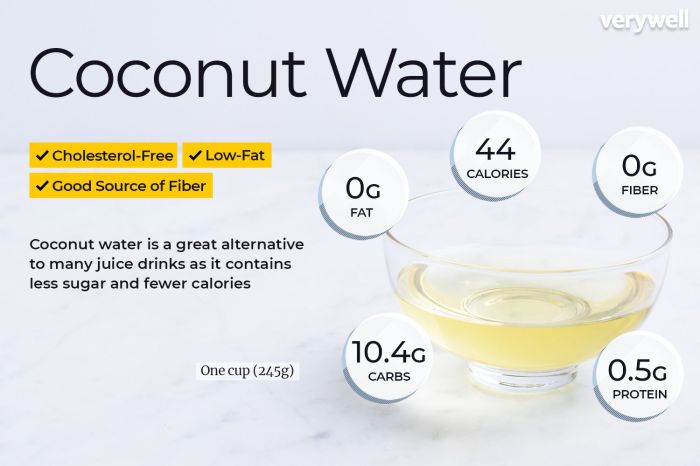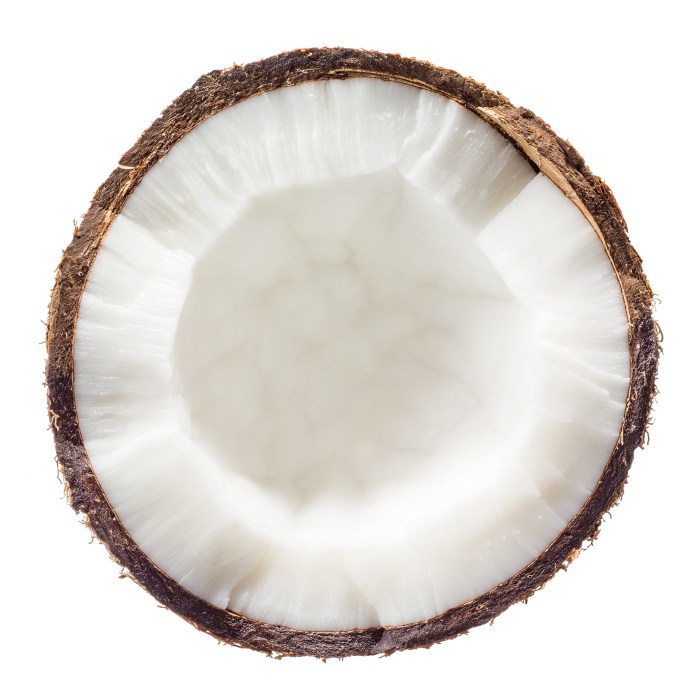Nutritional Composition of Coconut Meat

Coconut meat nutrition facts – Coconut meat: the delicious, creamy, and surprisingly nutritious part of the coconut. It’s not just a tropical treat; it’s a nutritional powerhouse packed with goodies that can contribute to a balanced diet. Let’s dive into the specifics!
Macronutrient Breakdown of Coconut Meat (per 100g serving)
This table provides a clear overview of the macronutrients found in a typical 100g serving of coconut meat. Remember that values can vary slightly depending on the specific type of coconut and growing conditions.
| Nutrient | Amount | Unit | % Daily Value (DV)* |
|---|---|---|---|
| Fat | 35 | g | 54% |
| Carbohydrates | 15 | g | 5% |
| Protein | 3 | g | 6% |
Percentage Daily Values are based on a 2000 calorie diet. Your daily values may be higher or lower depending on your calorie needs.
Fat Composition and Health Implications
Coconut meat is notably high in fat, but it’s crucial to understand thetype* of fat. It’s predominantly saturated fat, specifically lauric acid, which is a medium-chain triglyceride (MCT). While saturated fats have historically gotten a bad rap, research is increasingly nuanced. MCTs like lauric acid are metabolized differently than long-chain saturated fats, and some studies suggest potential benefits for cholesterol levels and even heart health, although more research is needed to definitively confirm these effects.
Coconut fat also contains small amounts of unsaturated fats, including monounsaturated and polyunsaturated fats, which contribute to the overall nutritional profile. Moderation is key, as with any high-fat food.
Coconut meat boasts healthy fats and fiber, a delightful contrast to the often overlooked nutritional profile of other beverages. For a different perspective, check out the nutrition facts for tonic water , a surprisingly complex drink compared to the straightforward goodness of coconut. Returning to coconut, remember its potassium content is also a key benefit for overall well-being.
Carbohydrate Composition
Coconut meat contains a moderate amount of carbohydrates, but the breakdown is interesting. A significant portion is fiber, which contributes to digestive health and feelings of fullness. The remaining carbohydrates consist of sugars, primarily sucrose, glucose, and fructose. The relatively low carbohydrate content, coupled with the fiber, makes coconut meat a relatively low glycemic index food, meaning it doesn’t cause a rapid spike in blood sugar levels.
Vitamins and Minerals in Coconut Meat
While not a primary source of vitamins and minerals, coconut meat does offer a modest contribution to your daily intake. It contains small amounts of essential minerals like manganese, potassium, and copper, and trace amounts of B vitamins like thiamine and riboflavin. These contribute to various bodily functions, including energy production, bone health, and nerve function. The exact amounts vary depending on factors such as the age and variety of the coconut.
Potential Drawbacks and Considerations

Let’s be honest, even the most delicious things have a downside. While coconut meat is a nutritional powerhouse, it’s not a free pass to a lifetime of guilt-free indulgence. Like any food, moderation is key, and understanding its potential drawbacks is crucial for making informed choices. This section will delve into some areas where caution might be warranted.
High Saturated Fat Intake and Pre-existing Conditions
Coconut meat boasts a significant amount of saturated fat. While not all saturated fats are created equal, and coconut’s medium-chain triglycerides (MCTs) are metabolized differently than those found in other foods, high intake can still pose concerns for individuals with pre-existing conditions. For example, people with high cholesterol or a family history of heart disease might need to monitor their coconut consumption carefully.
It’s not about eliminating it entirely, but rather incorporating it thoughtfully into a balanced diet. Consulting a doctor or registered dietitian is always advisable for personalized guidance. Remember, a small handful of shredded coconut in your smoothie is far different from consuming large quantities daily.
Coconut Allergies and Associated Symptoms
Although less common than other nut allergies, coconut allergies are a real possibility. Symptoms can range from mild, such as itching or hives, to severe, including anaphylaxis, a life-threatening reaction requiring immediate medical attention. If you experience any adverse reaction after consuming coconut, seek medical advice immediately. Cross-reactivity with other tree nuts is also possible; individuals with known tree nut allergies should exercise extra caution.
Reading food labels carefully and avoiding products containing coconut, even in trace amounts, is crucial for those with allergies. It’s always better to be safe than sorry.
Glycemic Index and Blood Sugar Control
Coconut meat has a moderate to high glycemic index (GI), meaning it can cause a relatively rapid rise in blood sugar levels. This is particularly important for individuals with diabetes or those managing their blood sugar. While the MCTs in coconut might offer some metabolic benefits, the overall carbohydrate content can still impact blood glucose levels. Portion control is essential, and pairing coconut with high-fiber foods can help moderate the glycemic response.
For example, enjoying a small amount of coconut with a bowl of berries will slow down the sugar absorption compared to eating it alone. Always consult with a healthcare professional for personalized dietary recommendations related to blood sugar management.
Interactions with Medications and Health Conditions
While generally safe for most people, coconut meat consumption might interact with certain medications or health conditions. For instance, individuals taking blood thinners should be cautious, as some studies suggest coconut oil might affect blood clotting. Similarly, people with thyroid conditions might need to monitor their intake as coconut can potentially interfere with thyroid medication absorption. This isn’t a blanket warning against coconut; it highlights the importance of discussing your diet, including coconut consumption, with your doctor, particularly if you are on medication or have a chronic health condition.
Transparency with your healthcare provider is always the best approach.
Incorporating Coconut Meat into a Healthy Diet

Coconut meat, that delightful, creamy treasure from the tropical heart of the coconut, isn’t just a delicious treat; it’s a surprisingly versatile ingredient that can easily find its way into a healthy and balanced diet. Forget the tired old image of coconut just in desserts – we’re talking about integrating this nutritional powerhouse into your everyday meals, adding a unique flavour and texture boost to everything from breakfast bowls to evening dinners.
Let’s explore how to unleash the culinary potential of coconut meat.
Creative Coconut Meat Incorporation into Meals, Coconut meat nutrition facts
The beauty of coconut meat lies in its adaptability. Its mild sweetness and satisfying texture make it a perfect addition to both sweet and savory dishes. Here are some inventive ways to incorporate it into your daily meals:
- Breakfast: Start your day with a tropical twist! Add shredded coconut meat to your oatmeal or yogurt for a boost of flavor and texture. Imagine a creamy coconut yogurt parfait layered with granola and fresh berries – pure deliciousness.
- Lunch: Think beyond the usual salad. Add desiccated coconut to your chicken salad or tuna salad for a satisfying crunch. Or, incorporate shredded coconut into a vibrant curry for a taste of the tropics.
- Dinner: Coconut milk, extracted from the coconut meat, is a culinary superstar! Use it to create creamy coconut curries, rich coconut soups, or even as a base for a unique coconut-based sauce for your grilled fish or chicken. Alternatively, finely shredded coconut meat can be added to stir-fries for a subtle sweetness and pleasing texture.
- Snacks: Make your own energy balls using desiccated coconut, nuts, and seeds. The combination of healthy fats and natural sweetness makes for a perfect guilt-free snack. Or, simply enjoy a handful of fresh coconut meat as a naturally sweet and satisfying treat.
Sample Meal Plan with Coconut Meat
This sample meal plan showcases the versatility of coconut meat in a healthy and balanced diet. Remember to adjust portion sizes to fit your individual caloric needs.
| Meal | Description | Coconut Meat Serving | Other Ingredients |
|---|---|---|---|
| Breakfast | Coconut Yogurt Parfait | 1/4 cup shredded coconut | Plain yogurt, granola, berries |
| Lunch | Chicken Salad Sandwich on Whole Wheat | 2 tablespoons desiccated coconut | Cooked chicken, celery, mayonnaise, whole wheat bread |
| Dinner | Coconut Curry with Chicken and Vegetables | 1/2 cup coconut milk (from coconut meat) | Chicken breast, broccoli, carrots, potatoes, curry powder |
| Snack | Coconut Energy Balls | 1/4 cup desiccated coconut | Dates, almonds, chia seeds |
Preparing Coconut Meat: Diverse Culinary Applications
Coconut meat can be prepared in several ways, each offering unique culinary applications:
- Shredded Coconut: Perfect for adding texture and subtle sweetness to desserts, salads, yogurts, and savory dishes. Imagine it sprinkled over a warm fruit crumble or incorporated into a vibrant tropical salsa.
- Desiccated Coconut: A dried form of coconut, ideal for adding a crunchy texture to baked goods, energy bars, and even sprinkled over curries for a delightful contrast. Picture its satisfying crunch in homemade granola bars or a tropical fruit cake.
- Coconut Milk: Extracted from the coconut meat, coconut milk is incredibly versatile. It’s the star ingredient in creamy curries, soups, sauces, and even desserts. Envision its richness in a creamy Thai coconut soup or a luscious coconut flan.
Selecting and Storing Coconut Meat
Choosing high-quality coconut meat and storing it properly is key to maintaining its freshness and nutritional value. Look for coconuts that are heavy for their size and have no cracks or damage. Once opened, store fresh coconut meat in the refrigerator for up to 5 days. Desiccated coconut should be stored in an airtight container in a cool, dry place.
Proper storage ensures you enjoy the full flavor and nutritional benefits of this tropical delight.
Helpful Answers: Coconut Meat Nutrition Facts
Is coconut meat good for weight loss?
While coconut meat contains healthy fats and fiber, which can contribute to satiety, its calorie density means portion control is crucial for weight management. It shouldn’t be considered a weight-loss food in itself.
Can I eat coconut meat if I have diabetes?
Coconut meat has a moderate glycemic index, so it’s important to consume it in moderation and monitor blood sugar levels. Consult with a doctor or registered dietitian for personalized advice.
Are there any known interactions between coconut meat and medications?
While rare, some individuals may experience interactions with blood thinners. It’s best to consult your doctor if you’re on any medication.
What’s the difference between desiccated coconut and fresh coconut meat?
Desiccated coconut is dried and often has added sugar. Fresh coconut meat offers a higher water content and a less intense flavor.